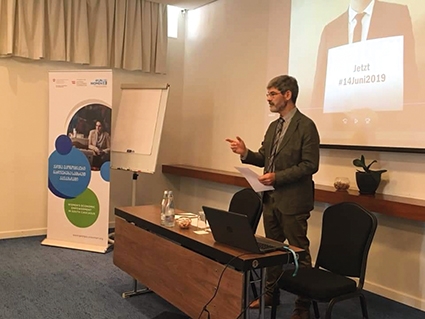Workshop on Gender & Economics in Georgia
This Monday, July 22, the UN Women project Women’s Economic Empowerment (WEE) in the South Caucasus held a Workshop on Gender and Economics. The workshop, held at the Radisson Blu Iveria hotel in Tbilisi, was a day-long event aimed at high-level representatives from the government, donor agencies, UN organizations, and the private financial sector. The project is financed by the Swiss Agency for Development and Cooperation (SDC) and Austrian Development Cooperation. The Swiss Government is active in Georgia, supporting the economic empowerment of women, especially in rural areas.
The workshop was a condensed version of a five-day training at Lopota Lake, also organized within the project, focusing on economic development and its intersection with gender. Specifically, identifying the key issues within economics where gendered dimensions can contribute to economic development and growth.
Welcome remarks were given by Deputy Minister of Economy and Sustainable Development Ekaterine Mikabadze, UN Resident Coordinator in Georgia Sabine Machl, Deputy Regional Director of the Swiss Cooperation Office (SCO) for the South Caucasus Werner Thut, and UN Women Deputy Representative Tamar Sabedashvili.
Mikabadze began by acknowledging that women’s economic empowerment is a “hot topic in today’s world,” and connecting to “the top priority of [the Georgian] government, inclusive growth.” She noted that “without providing equal opportunities to every economic agent in the country it is impossible to achieve this goal...Without providing equal opportunities to our citizens it’s impossible to achieve targets.” While recognizing the significant work done in the last few decades in Georgia, “challenges still remain,” said Mikabadze, and “that’s why we put stress on today’s topic of discussion...According to the World Bank’s estimation, if women who currently do not engage in the economy were to do so, it’s estimated that the level of our economic activity would increase by 11%. So, you see, the benefits are really tangible.”
Machl followed, with an address to the participants that focused on cooperation and joint effort, thanking the government officials, in particular, who took the time to attend the workshop. Machl pointed to the necessity of not only declaring, in unison, that it is time to end gender inequality, but to take concrete policy steps to dismantle the institutions that maintain such inequality. “We have globally a very clear consensus, but very often it is the social norms or the uneven distribution of the care work that hold women back in the world...unpaid care work is one thing where we all share the same challenges...in Georgia, we see that women are significantly underrepresented in economic activities,” explained Machl. She further added that the primary drivers of women’s low economic activity in Georgia are “traditional gender roles and the burden of unpaid care work.” She urged policymakers to take action based on the insights provided by gender economics. Machl closed on a positive note, saying “having all of you here is proof that you care.”
“Women Economic Empowerment and Gender Equality is a challenge which is not limited to Georgia and other countries of the South Caucasus. Switzerland saw the largest demonstration in recent history with a huge turnout of around 500’000 people requesting equal treatment, equal pay and no more violence against women,” mentioned Deputy Regional Director of the SCO Werner Thut in his opening speech.
Werner Thut shared a video clip in support of his statement that inequality is not a problem unique to Georgia, but even in developed economies with very old traditions of liberal democracy, the problem still exists. He observed that the perspective and approach presented within the workshop were obviously the result of solid scientific research, underpinned with international data and, thus, potentially relevant also for Georgia and its decision-makers. He commended and congratulated UN Women and Dr. Ilkkaracan for their work. Referring to the role of bilateral development partners such as the SDC, their contribution in his view should certainly not be to take a stance with regard to potential policy recommendations and conclusions. However, international stakeholders should contribute to make the knowledge and potential policy options accessible to the Government of Georgia and other stakeholders, in support of evidence-based, informed decisions for addressing issues of gender inequality through public policies. “We would like to invite all interested stakeholders – including the public authorities of Georgia: governmental institutions, parliamentary bodies and others - to participate in these efforts and debates. The Swiss Cooperation Office of the South Caucasus will certainly continue to support and contribute to this important work, in the context of its WEE Program,” said Werner Thut.
Finally, Sabedashvili called on high-level decision makers to offer political support to women’s economic development. “This here is where the change starts,” said Sabedashvili, “It’s one thing to discuss in these settings, to theorize...but how this actually gets translated to policymaking and political agenda, this is [what really matters] ...my modest request to all of you is to take [full advantage of] this opportunity, because we have invested heavily in this, along with Austria and Switzerland.”
Noted economist Dr. Ipek Ilkkaracan led the workshop. Ilkkaracan is a Professor of Economics at Istanbul Technical University and Levy Economics Institute – New York, Visiting Scholar at Sapienza University of Rome, and co-author of the UN Women Gender and Economics Training Manual. Ikkaracan took participants through international research and data on gender-aware economics, labor markets and gender inequalities, unpaid work, time- and income-poverty, and the intersections of gender and monetary and fiscal policy.
By Samantha Guthrie
Photo: Swiss Agency for Development and Cooperation












